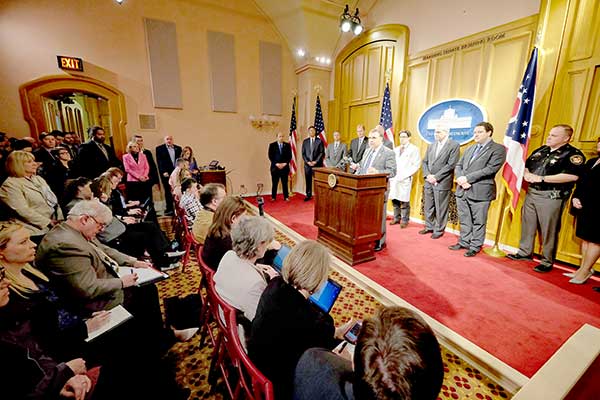|

|
Medical
Marijuana Task Force Findings, Plan Moving Forward
New bill would create commission to tightly regulate marijuana policy
COLUMBUS—Speaker of the Ohio House Clifford A. Rosenberger
(R-Clarksville) and State Representative Kirk Schuring (R-Canton)
discussed takeaways from the recently concluded Medical Marijuana Task
Force hearings and shared a plan moving forward on the issue in Ohio.
“The task force was created with no preconceived ideas or results in
mind,” said Schuring, who chaired the task force. “Our goal was simply
to bring diverse and divergent opinions together to start a
conversation and to gather as much information about the subject as
possible.”
The task force held seven hearings in all and heard about 25 hours of
testimony from more than 100 individuals who testified on all sides of
the medical marijuana debate. Among those who testified were medical
professionals, experts from around the country, Ohioans suffering from
pain and illness, employers, law enforcement officers and
representatives from drug addiction facilities.
“I first want to applaud Representative Schuring for his diligent work
in chairing the task force and for the members of the panel who devoted
so much of their time so that Ohioans could have the opportunity to
share their voice,” Rosenberger said. “As this process moves forward, I
believe it is imperative that our efforts focus solely on medical
marijuana and its implications, while remaining steadfast in our
mission to fight against the state’s drug addiction problem.”
During the press conference, the legislators also discussed some of the
steps moving forward, including legislation that is planned to be
introduced this week, which will be sponsored by Rep. Stephen Huffman
(R-Tipp City).
The legislation would create the Medical Marijuana Control Commission,
a nine-person panel appointed by the Governor, Senate President and
House Speaker. The commission would be responsible for closely
regulating marijuana policy in Ohio, including licensing entities
involved in the process such as cultivators, retail dispensaries,
independent labs and physicians. The bill would allow only for licensed
physicians to recommend and dispense marijuana for medical purposes.
“As members of the Ohio House, we are elected to lead, and that is what
we are doing by forming the Medical Marijuana Control Commission,”
Huffman said. “With this bill, we will be able to regulate operations,
ranging from growing to manufacturing, as well as various medical
conditions, and we’ll be able to change it in the future as the issue
continues to evolve.”
The bill does not mandate that employers must accommodate an employee’s
use of medical marijuana in the workplace, and it allows an employer to
refuse to hire or take other employment action against an employee
because of medical marijuana use. Individuals discharged from their
jobs because of medical marijuana use would be disqualified from
receiving unemployment compensation benefits.
If signed into law, medical marijuana legalization would be phased in
over a two-year period: One year to promulgate rules and another year
to move forward for implementation. From seed to sale, medical
marijuana would be tightly regulated and taxed.
Also under the bill:
· Home-growing marijuana is prohibited
· The Commission will conduct background checks on all applicants
· The Commission will establish and maintain a record containing the
number of patients and medical conditions for which medical marijuana
is recommended
· The General Assembly and Administration will advocate Congress and
the US Drug Enforcement Administration to reschedule marijuana from
Schedule I to Schedule II
· The General Assembly shall create an incentive program for
institutions of higher learning and medical institutions to perform
academic and medical research
· Minors must have consent from a parent or guardian to use medical
marijuana
|

|
|
|
|

